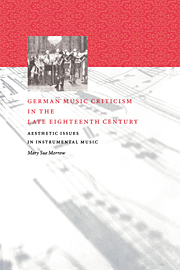Book contents
- Frontmatter
- Contents
- Acknowledgments
- Author's note
- Introduction: terms of discourse
- 1 What does instrumental music mean?
- 2 Answering with a unified voice
- 3 Answering with a German voice
- 4 Answering with aesthetic criteria
- 5 The importance of being correct
- 6 The reign of genius
- 7 A call to order
- 8 Epilogue: segue to the nineteenth century
- Notes
- Bibliography
- Index
7 - A call to order
Published online by Cambridge University Press: 03 October 2009
- Frontmatter
- Contents
- Acknowledgments
- Author's note
- Introduction: terms of discourse
- 1 What does instrumental music mean?
- 2 Answering with a unified voice
- 3 Answering with a German voice
- 4 Answering with aesthetic criteria
- 5 The importance of being correct
- 6 The reign of genius
- 7 A call to order
- 8 Epilogue: segue to the nineteenth century
- Notes
- Bibliography
- Index
Summary
Hamburgischer Correspondent (1790): Jean Bliesenet's Trois Duos pour deux Violons.
The first duet in G major begins with something exquisite. It appears to be an imaginative introduction that touches on different leading tones in the space of eleven measures, and only then turns to the actual scale, which is abandoned two measures later. The composer's genius shows itself most clearly in this duet; only occasionally does it burst forth too much.
Musikalische Monatsschrift (1792): Schwencke's Drei Sonaten and Trois Sonates.
The composer can certainly be trusted to separate the good and beautiful things in this early work from the less good, to cut out, of his own accord, the stormy confusion of his youthful Phantasie, which – unconcerned about strict unity – lets flow an abundance of ideas for good or ill, just as they present themselves.
The third and final period of the review collective's evolution did not make as sudden and dramatic an entrance as had the second, when the rejection of compositional correctness and the embracing of creative genius happened simultaneously at the end of a decade. Reviewers continued to extol the virtues of creative genius, now firmly established as the centerpiece of aesthetic criteria. Not even the slightest of genres could escape its requirements: the Tübingische gelehrte Anzeigen faulted a collection of dances for their lack of novelty and the poverty of ideas, and the Musikalische Korrespondenz dismissed some Hungarian dances as “so devoid of charm and novelty in the ideas that the musical public would not have lost anything had the child been strangled at birth.”
- Type
- Chapter
- Information
- German Music Criticism in the Late Eighteenth CenturyAesthetic Issues in Instrumental Music, pp. 134 - 150Publisher: Cambridge University PressPrint publication year: 1997



